Writing About Family in French - Beginner Lesson
- Brian J. Donovan
- Categories : French lesson plans for secondary grades 6 12
- Tags : Teaching english speaking students a second language
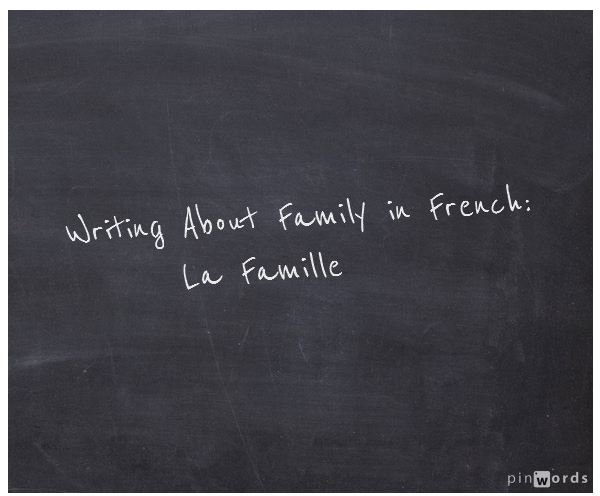

Discussing Family in French
Language level: I try to make all of my lessons easily adaptable to different levels, but this is geared more towards beginners. For more advanced students, it will be review. For this lesson on writing about the family in French, your students will begin by learning basic family vocabulary, and they’ll pull together the basics they’ve already learned about simple sentence structure and verbs like être and avoir.
[caption id="" align=“aligncenter” width=“600”]
Grade level: 6 or 7 through university Format: I’ve kept the format very simple to avoid too many layout issues. Paste the text into a document, and you can make the changes you’d like to make. I’ve given you a Student Section (below) which you can copy to a document, so you have something to hand out to your students. Your students will be able to follow along and make notes on the page as you talk about the different parts of the lesson. This Teacher Section will have tips and suggestions to share with them.
Writing about Family in French: Teacher Section
*Teacher: Some students aren’t comfortable talking about their families, so I tell them it’s ok to make it up! The whole point is to use the vocabulary and to put together sentences. A. Le Vocabulaire / Vocabulary Begin by introducing basic vocabulary. I use un/une a lot, and always tell my students to learn words with those, so they’ll more easily remember the gender. It’s not as important with a word whose gender is obvious, but it’s a good practice. (Note: be sure to remind them about le and la becoming l’.) 1. Qui / Who: *Teacher: You may have to add words to fit different family make-ups. Hint: If “sœur” is difficult for them, remind them to ignore the -o and that leaves them with -eu.
- une mère / mother
- un père / father
- un fils / son
- un garçon / boy
- un frère / brother
- une fille / daughter, girl
- un mari / husband
- un homme / man
- une femme / wife, woman
- un grand-père / grandfather
- un petit-fils / grandson
- une tante / aunt
- un oncle / uncle
- un cousin / male cousin
- une cousine / female cousin
- une sœur / sister
- un(e) enfant / child
- une nièce / niece
- un neveu (-x) / nephew
- une grand-mère / grandmother
- une petite-fille / granddaughter
2. L’État Civil / Marital Status: *Teacher: Once again, you may have to add words to fit different family make-ups. Remind them of the difference between “mari” and “marié.”
- célibataire / single
- fiancé(e) / engaged
- décédé(e) / deceased
- veuf / veuve / widower / widow
- marié(e) / married
- divorcé(e) / divorced
- remarié(e) / remarried
3. Les Adjectifs Possessifs / Possessive Adjectives: Possessive adjectives personalize your writings about your family. You wouldn’t want to constantly say, “I have a mother. I have a brother. I have an aunt.” You can use the different forms of “my” (mon, ma, mes) to vary your sentences. 4. Les Verbes / Verbs: You won’t need a lot of verbs to talk about your family: Être, avoir and habiter should be enough for most descriptions. *Teacher: I find examples often work best, but if you’d like you can spend time talking about the basic verbs they’ll need–or even ask them what verbs they think they’ll need! I have sample sentences for you in section II. Don’t forget to talk about “habiter” (live, reside/where) with a city, with states and streets, and how it differs from “vivre” (live/how, when). You may also want to talk about the difference between using “chez” and “avec.” B. Les Phrases / Sentences *Teacher: Examples tend to work best, so I’ve included some basic sentences to cover many situations. You can add as many as you’d like, and your students can take notes on their copies. Don’t forget to remind your students to also use words like “et” and “mais” to vary the sentences more. 1. Qui / Who (with verbs):
a. J’ai un frère/une sœur. J’ai deux frères./deux sœurs.
b. J’ai un petit frère/une petite sœur. J’ai un grand frère/une grande sœur.
*You can also teach aîné, cadet, etc. It’s depends on how much time you have to spend on the family lesson.
c. Je n’ai pas de frère(s)./pas de sœur(s). **Teacher: Remind them that the noun can be singular or plural, but that they’ll still use de/d’ in the negative in many cases…
d. On n’a pas d’animaux.
*Teacher: d’/vowel
e. C’est le frère de mon père. Le mari de ma tante (mon oncle) est décédé. (mort(e))
f. Mon oncle s’appelle Marc. Ma tante s’appelle Marie.
g. J’ai un oncle qui s’appelle Marc et il a 50 ans.
h. Mes parents s’appellent Sophie et Pierre. Mes parents sont Sophie et Pierre.
2. L’État Civil / Marital Status:
a. Mon frère est marié. Ma sœur n’est pas mariée.
b. Mes parents sont divorcés. Ma sœur est divorcée.
c. Je ne suis pas marié(e). Je suis célibataire.
d. J’ai un frère/une sœur qui n’est pas marié(e).
3. L’Age / Age:
a. Mon frère a 14 (quatorze) mois. Mon frère a 1 (un) an.
b. Mon frère a 9 (neuf) ans.
c. Mes deux sœurs ont 13 (treize) ans et 14 (quatorze) ans.
4. Où ? / Where?:
a. J’habite à Boston. **Teacher: à + ville
b. Mes parents habitent en Californie. / en Floride. / dans le Vermont. **Teacher: masculine & feminine//au
c. Mon grand-père habite avec un ami. / Mon grand-père habite chez ma tante. / tout(e) seul(e)
d. Mon cousin habite 9 Rue Corbert. Ma tante habite une grande maison/un bel appartement.
e. Mes grands-parents sont en France. / au Méxique.
Follow these additional French study guides for more practice!
- French cuisine
- The completed past
Student Section
<strong>Download the Student Section Here.</strong>
Unconventional language hacking tips from Benny the Irish polyglot; travelling the world to learn languages to fluency and beyond!
Looking for something? Use the search field below.
Home » Articles » Talk About Family in French – A Guide to French Family Vocabulary [with Audio]
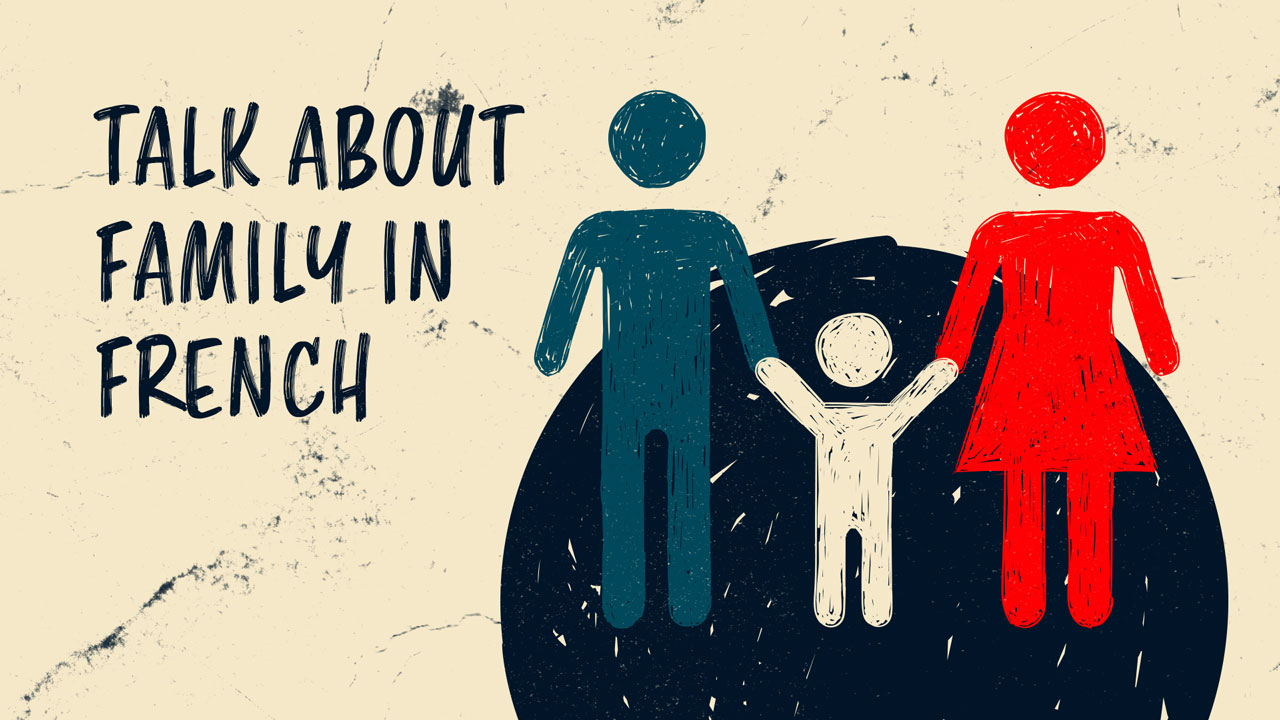
Full disclosure: This post contains affiliate links. ?
written by Alice Cimino
Language: French
Reading time: 13 minutes
Published: Feb 28, 2022
Talk About Family in French – A Guide to French Family Vocabulary [with Audio]
If you’re learning French, you should learn how to talk about family in French. That’s because family is an important topic that often comes up in conversations. In this article, I’ll share the words you need to know, with audio recordings from myself, a native French speaker.
Allons-y! Let’s get started.
Table of contents
French words to talk about your family.
- How to Say “Family” in French: Famille
Rules of Gender, Number Agreement, and the French Family Member Collectives
French terms of endearment for family members, how to write about your family in french – some more vocabulary.
- 1. Qu’est-ce qu’on a fait au Bon Dieu ?
- 2. C’est quoi cette famille?!
- 3. Il a déjà tes yeux
You’re All Set to Talk About Your Family in French!
Psst… Do you like French cinema? Stick around until the end of the article for French movie recommendations that revolve around family!
“Family” in French is famille .
To say “family member” in French you would say membre de la famille . You can also say parent , which also translates to “parent”, as in father or mother.
If you want to talk about family in French, you will need to know the appropriate words to describe the different liens de famille (“family relationships”).
Immediate family:
- la femme or l’épouse – “the wife”
- le mari or l’époux – “the husband”
- les parents – “the parents”
- la mère – “the mother”
- le père – “the father”
- les enfants – “the children”
- la fille – “the daughter”
- le fils – “the son”
- la sœur – “the sister”
- le frère – “the brother”
Extended family:
- la tante – “the aunt”
- l’oncle – “the uncle”
- la nièce – “the niece”
- le neveu – “the nephew”
- la cousine – “the cousin” (feminine)
- le cousin – “the cousin” (masculine)
- la petite-fille – “the grand-daughter”
- le petit-fils – “the grandson”
- la grand-mère – “the grandmother”
- le grand-père – “the grandfather”
- l’arrière-petite-fille – “the great-granddaughter”
- l’arrière-petit-fils – “the great-grandson”
- l’arrière-grand-mère – “the great-grandmother”
- l’arrière-grand-père – “the great-grandfather”
All of these form les proches (“close relations”).
Since this is a lot of information, you can download this chart to keep it for further studies:
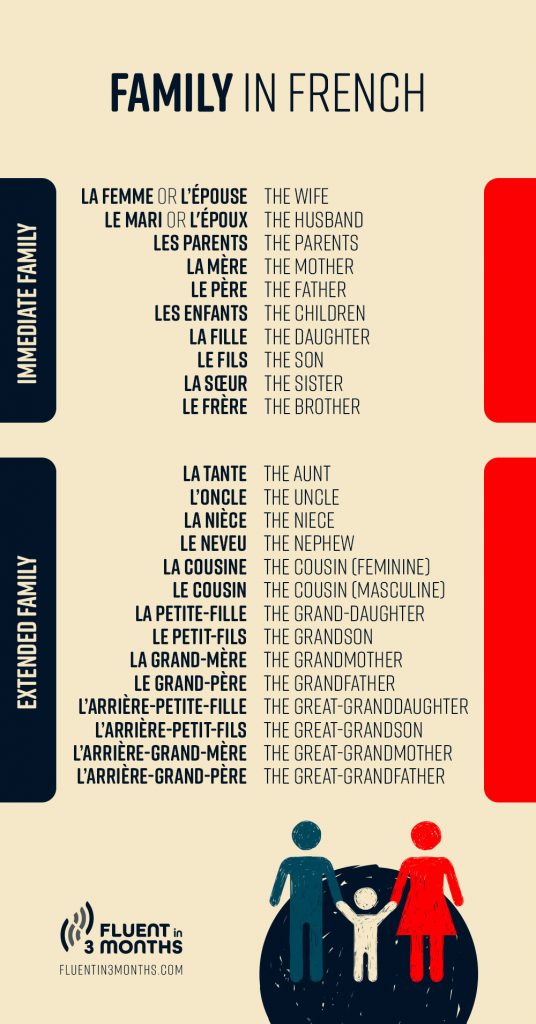
Step-family:
- la belle-mère – “the stepmother”
- le beau-père – “the stepfather”
- la demi-sœur – “the stepsister” or “the half-sister”
- le demi-frère – “the stepbrother” or “the half-brother”
- la belle-fille – “the stepdaughter”
- le beau-fils – “the stepson”
- la belle-mère – “the mother-in-law”
- le beau-père – “the father-in-law”
- la belle-sœur – “the sister-in-law”
- le beau-frère – “the brother-in-law
- la belle-fille – “the daughter-in-law”
- le beau-fils – “the son-in-law”
It might also be useful for you to learn the members of the “godparent family”:
- les parrains – “the godparents”
- la marraine – “the godmother”
- le parrain – “the godfather”
- la filleule – “the goddaughter”
- le filleul – “the godson”
How to Say “Family” in French: Famille
As I mentioned above, “Family” in French is famille .
Famille is a noun, so you will often see famille coming after an article or a pronoun.
The most common ones are:
- La famille – “(the) family”
- Une famille – “a family”
- Ma famille – “my family”
Let’s pause for a second and take a look at how similar famille is to “family”. These words are cognates : even though they’re from different languages, their spelling and pronunciation are similar, and they have the same meaning.
Cognates help you start learning a new language by giving you an instant vocabulary base. One of our favorite courses at Fi3M , French Uncovered , teaches you to recognise French cognates from the very start of yourjourney learning French. It’s a great way to feel more confident in your knowledge and less intimidated by your target language.
(Remember, at Fi3M we’re all about simple language hacks like this that help you learn a language faster 😉.)
The Different Types of Family in French
Once you’ve mastered how to say famille , you can go a little more in-depth and learn the different types of family categorization in French:
- la famille nucléaire or la famille traditionnelle – “immediate family”
- la famille monoparentale – “single-parent family”
- la famille recomposée – “stepfamily” or “reconstituted family”
- la famille élargie or la famille étendue – “extended family”
- la belle-famille – “in-laws”
- la famille adoptive – “adoptive family” or “foster family”
French follows rules of gender and number agreement. This means that if a noun is feminine, the article and adjective(s) that describe it will also be feminine. The same goes for when a noun is singular or plural. This is important to know if you want to describe your family members, for example.
Let’s look at how the agreement rules work.
While we’re looking at the plural forms of French family members, let’s talk about the collective terms for family members. These are words like “the parents” or “the siblings”, which describe the whole group of family members with the same titles, regardless of their gender.
Here are the most common:
- les parents – “the parents”
- all other terms with parents in them, such as les grandparents
- les enfants – “the children”
- all other terms with enfants in them, such as les petits-enfants
- les cousins – “the cousins”
For the other collective terms, you would mention the plural of both the masculine and femenine members. Here are some examples:
- les frères et sœurs – “the siblings”
- les oncles et tantes – “the uncles and aunts”
When you’re referring to several members of the same gender, for examples “the sisters”, you would use the plural of the term, so les sœurs .
When I’m speaking French with my parents, I don’t call my them * mère (“mother”) and père (father).
For parents, the most common terms used in French are:
- la maman – “the mom”
- le papa – “the dad”
There isn’t a collective term for parents other than parents in French, you would simply say maman et papa (“Mom and Dad”).
Grandparents too have their own terms of endearment:
- la mamie – “the granma”
- le papi (sometimes also spelt papy ) – “the grandpa”
You might also hear mémé (“grannie”) and pépé (“granda”), although they are more old fashioned words. My grandmother has never wanted her grandchildren to call her mémé ; she says it makes her sound too old!
For siblings, adding petit(e) or grand(e) does the work:
- petite sœur – “little sister”
- petit frère – “little brother”
- grande sœur – “big sister”
- grand frère – “big brother”
When it comes to the rest of the family, oncle has a more tender version: tonton (“uncle”). In some places, tante also has a sweeter version in tatie . In Guadeloupe, where I grew up, children use tatie as an affectionate term for women, even if they aren’t their aunts.
You’ve learnt the basics of French family vocabulary. Now are you ready for some more specific phrases?
Here are a few phrases you might want to know to talk or write about your family:
- J’ai une grande famille – “I have a big family.”
- J’aime ma famille – “I love my family.”
- La famille d’abord – “family comes first”
- La famille pour toujours – “family forever”
Depending on how deep you get into conversation about your family tree, you might want to know how to say just that. In French, “family tree” is arbre généalogique , which literally translates to “genealogical tree”.
French Cinema and Family – A Few Recommendations
French cinema likes to focus on family. Extended families, reconstituted families, adoptive families… All of them can be the foundation of great French comedy!
As promised at the beginning of the article, here are some of the most popular French films about family.
1. Qu’est-ce qu’on a fait au Bon Dieu ?

Qu’est-ce qu’on a fait au Bon Dieu ? , or “Serial (Bad) Weddings” in English, is a comedy that features an extended family.
Claude and Marie, a Catholic bourgeois couple from a small village in the north of France, see their conservative views challenged by the marriages of their daughters. The three eldest have married men of different ethnic origins and religious beliefs, so their hopes for a Catholic son-in-law rest with their youngest.
This movie and its sequel, which both star some famous French comedians, is a window into complex French modern culture.
2. C’est quoi cette famille?!
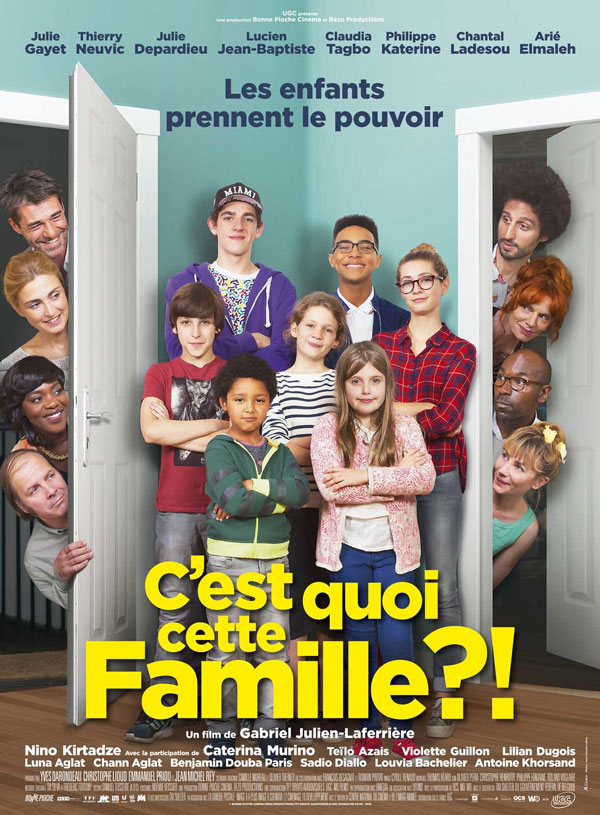
C’est quoi cette famille?! , or “We Are Family” in English, focuses on a reconstituted family.
After several marriages and divorces of both his parents, thirteen-year-old Bastien finds himself part of a very big reconstituted family. Tired of being moved from house to house for shared parenting, the many “half-siblings” decide to live together and have their parents move houses instead.
Even though this movie exaggerates for the sake of comedy, it taps into the reality of reconstituted families, which are very common in France.
3. Il a déjà tes yeux

Il a déjà tes yeux , “He Even Has Your Eyes” in English, is the story of a black couple who can’t have biological children and decide to adopt a baby. The baby is four-months-old, and white. Several people around the couple refuse to accept the adoption.
There is also a mini series whose events take place after the movie.
You can now shop at the père et fils business and listen to your B&B host’s story, and understand everything! Well, at least the part about the family.
If you’re looking for more vocabulary to learn, you could start by checking out this guide to 27 French colors (with audio).
If you’re ready for something else, try working on grammar! French pronouns are a good starting point.
Or maybe try some of these articles:
- How to Speak French: The Faster Way to Learn French
- FrenchPod101 Review: 30 Days with FrenchPod101
- 111 Core French Words — The Most Commonly Used Words in French
- An In-Depth Review of the Staircase Method — Learn a Language through Story
- 30+ Free Online French Classes and Resources (Only the Best!)
Alice Cimino
Student, Freelance Content Creator
Alice is an undergraduate student who loves fiction, languages, and challenges. She's a bilingual by birth and a quadrilingual by consequence .
Speaks: French, Italian, Spanish, English
Have a 15-minute conversation in your new language after 90 days

French Family Culture and Vocabulary
- Everything About
- The alphabet
- Funny phrases
- Common words
- Untranslateable Words
- Reading Hacks
- Writing Tips
- Pronunciation
- Telling time
- Learn FASTER
- More resources
By OptiLingo • 5 minute read

What Role Does Family Play in French Society?
The French value family above all else. They cherish these close relationships and it’s an important part of French culture. But, you should know more than just the French vocabulary for family members. You should also know what a typical French family is like. The family life culture is an important aspect of modern France, and being familiar with it is extremely useful as you’re progressing towards French fluency .

Psst! Did you know we have a language learning app?
- It teaches you useful words and phrases.
- Presented in a natural, everyday context.
- Spaced out over time, so you absorb your new language organically.
- It’s kind of like learning the words to your new favorite song!
You’re only one click away!
French Family Vocabulary
Having a well-rounded vocabulary is crucial to French fluency. However, don’t worry about how many words you know . Reaching proficiency in a foreign language is about knowing the right vocabulary . To start your discovery of French family dynamics, here are the most useful French family vocabulary words you should know:
Close Family
- ma famille – my family
- les parents – parents
- le mari – husband
- la femme – woman / wife
- le père – father
- le papa – dad / papa
- la mère – mother
- la maman – mom / mama
- la fille – daughter
- le fils – son
- la sœur – sister
- le frère – brother
- le demi-frère – half-brother
- la demi-sœur – half-sister
Grandparents
- le grand-père – grandfather
- le papi / le pépé – grandpa / grandad
- la grand-mère – grandmother
- la mamie / la mémé – grandma / granny
- les grands-parents – grandparents
- le petit-fils – grandson
- la petite-fille – grand daughter
- les petits-enfants – grandchildren
- l’oncle – uncle
- la tante – aunt
- le neveu / les neveux – nephew / nephews
- la nièce / les nièces – niece / neices
- le cousin / la cousine – cousin (male) / cousin (female)
- le beau-père – father-in-law
- la belle-mère – mother-in-law
- le beau-fils – son-in-law
- la belle-fille – daughter-in-law
Extra Terms
- l’aîné(e) – oldest, eldest
- le / la cadet(te) – youngest / younger
- les gosses – kids
- l’enfant – child
- le parrain – godfather
- la marraine – godmother
French Family Culture in French Society
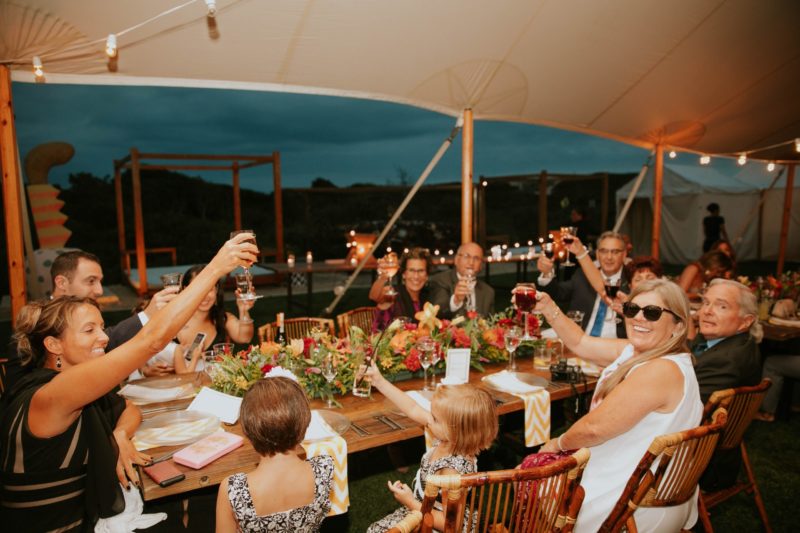
French views on the family are rooted in a sense of family identity and society. This is in stark contrast to the English and American emphasis on individuality. In English-speaking communities, families encourage self-expression. Each person is unique, but the family construct remains the same.
However, in France, it’s a different value system. Families are tight-knit groups. Individualism isn’t encouraged. Instead, the French family bond defines everyone. And you can see the effect of this attitude throughout France.
The relationships between members of French families remain close. Even after their children become adults. Adult sons and daughters generally stay close to the family home. And it’s common for them to dine with their parents weekly and call them daily.
France Values Children as the Future

Raising a family in France is different than raising one in America. French parents, particularly in the middle class, take a stricter role than American parents. And the amount of freedom of movement that American children enjoy is not common in France.
French parents do not indulge children, either. They enforce the order by teaching their kids when to speak and listen. If a French child acts poorly, it reflects on the family. As a result, French parents teach their children that certain behaviors are unacceptable.
This approach to raising a family in France has stood the test of time even though there have been changes in society. These changes include an increase in single-parent homes, children born out of wedlock, and more women participating in the workforce. Despite these changes, the underlying view on how to raise children remains the same.
One issue that has become a concern is the idea that there are two societies in France. They are the “haves” and the “have nots.” Youth in France grow disaffected by a society that does not offer them the economic opportunities their parents had.
The 1995 film La Haine highlighted this problem and serves as a warning to the French society. It argues that there are problems that need to be addressed. Regular bursts of violence in the “banlieues” (suburbs) show that those problems are still acute.
French Family as a Lasting Foundation for Society

French people value equality in marriage. Despite the stereotype of the dominant French husband and the submissive French wife. In fact, husband and wife in French families hold equal responsibilities.
France also values equal marriage rights. Same-sex marriage has been legal in France since 2013 . This progressive step has inspired other countries in Europe to reevaluate their marriage laws.
French families tend to stay more closely connected to their relatives than they do in the United States or in England. While this is not always the case, American families tend to be scattered throughout the country. Not a lot of thought is given to keeping everyone physically close. French families live in the same area, developing large numbers of contacts and people who can rely on each other for support.
This structured environment and this sense of order and rigidity are not universal. There are individuals and families who do not live close to relatives and who do not adhere to the generally accepted views on parenting in France. But, these people are exceptions to the common traits found in most French families.
Reach French Fluency Fast
Although generalizing French families is hard, there’s one thing they all have in common: they all speak French. And if you want to truly experience French family life, you need to learn the language too. To reach fluency fast , use OptiLingo.
This language learning app is built on scientifically-proven language learning theories. Combining comprehensible input and spaced repetition , you will not only understand your lessons well, you’ll also commit them to memory. OptiLingo presents high-frequency phrases, so you’ll instantly learn how the locals speak . Discover how much easier learning French is with OptiLingo. Try FREE today !
Related posts

Paris Nightlife: Party Like a Local With These Tips

Top 10 Most Beautiful French Words

Express Your Feelings, Mood, and Emotions in French

Top 10 Best Apps to Learn French Fast
Many people believe they aren’t capable of learning a language. we believe that if you already know one language, there’s no reason you can’t learn another..


IMAGES
VIDEO
COMMENTS
1. Qui / Who: *Teacher: You may have to add words to fit different family make-ups. Hint: If “sœur” is difficult for them, remind them to ignore the -o and that leaves them with -eu. une mère / mother. un père / father. un fils / son. un garçon / boy. un frère / brother. une fille / daughter, girl.
Here are a few phrases you might want to know to talk or write about your family: J’ai une grande famille – “I have a big family.”. J’aime ma famille – “I love my family.”. La famille d’abord – “family comes first”. La famille pour toujours – “family forever”.
French Family Culture in French Society. French views on the family are rooted in a sense of family identity and society. This is in stark contrast to the English and American emphasis on individuality. In English-speaking communities, families encourage self-expression. Each person is unique, but the family construct remains the same.